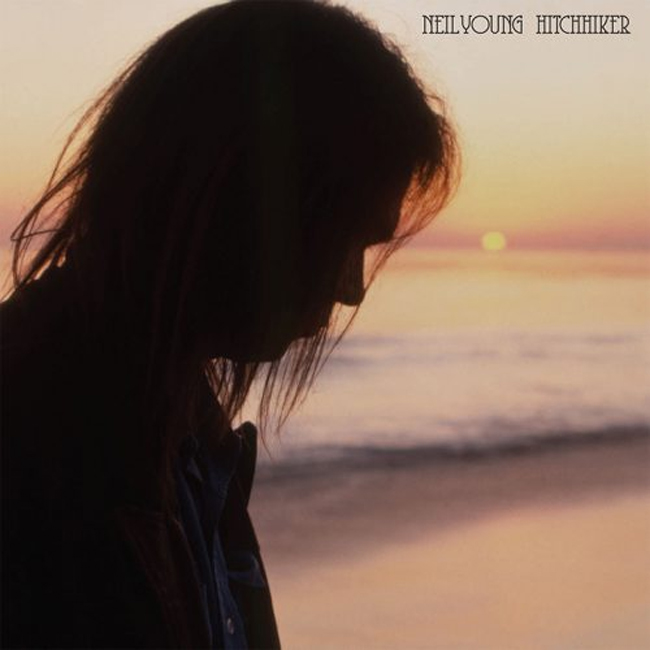Man, does Neil Young sound, well, young here. And confident. As well he should. He recorded the ten songs on Hitchhiker, out today, in one long session one night in 1976, just Young, his acoustic guitar, piano, and a harmonica, with producer David Briggs at the controls. This was supposed to be the follow up to Zuma, but apparently, the record company execs didn’t like it and it got shelved. Young went on to make American Stars n’ Bars instead, the only holdover being “The Old Country Waltz.”
But imagine what this album could have done at the time, opening with a one-two punch of “Pocahontas” and “Powderfinger,” two certified classics. Maybe it’s better this way. The public was introduced to Crazy Horse’s powerful treatment of “Powderfinger” a few years later on the electric side of Rust Never Sleeps. That’s the definitive version of the song, Young’s overdriven guitar at the point of breaking up and disintegrating into the air. But it’s essentially a folk song, and the narrative loses nothing in this stripped-down setting. “Pocahontas” got a slightly more robust arrangement on the acoustic side of Rust, but it’s more immediate here with Young’s voice front and center.
Young has been sifting through Hitchhiker’s remains for years, reclaiming the title track as recently as 2010’s Le Noise. It’s worth isolating this version and the later one to gauge how far Young has come since then. Both versions feature just Young and his producer. In the case of the latter, Daniel Lanois captured Young singing with his electric guitar, surrounding him in a nest of feedback and loops. It accentuated the fluidity of memory, the idea that, no matter how public w trip was, his memory is a lonely place only he can inhabit. But that rough trip through substance abuse and sudden fame was still fresh in his mind in ’76. It’s bright, clear, and almost marching. There was always an old man hiding in Young’s voice. He’s grown into it now. There’s more rumble to it, more frequencies. In ’76, it was more piercing, as high and lonesome as his harmonica.
“Hitchhiker” 1976
“Hitchhiker” 2010
Hitchhiker shows Young at the top of his game as a songwriter and performer, and how effective Young’s famously off-the-cuff approach to songwriting and recording can be. In Jimmy McDonough’s biography Shakey, Briggs talked about how stunningly on point Young was for these sessions. “He’d turn to me and go, ‘Guess I’ll turn on the tap’ – and then out came ‘Powderfinger,’ ‘Pocahontas,’ ‘Out of the Blue,’ ‘Ride My llama.’ Two days, a day. I’m not talking about sittin’ down with a pen and paper, I’m talkin’ about pickin’ up a guitar, sittin’ there and lookin’ me in the face and in twenty minutes – ‘Pocahontas.’ No lyric sheet, no pen, no paper, none of that bullshit. Just ‘I picks up the guitar and the demon takes control.’”
There are ten songs on this album, all recorded in a single session, all of them strong, compelling performances. “Out of the Blue” isn’t one of them, but the others Briggs mentioned are, along with “Captain Kennedy,” “Human Highway,” and “Campaigner.” There are only two tracks that had not made their way onto other releases – “Hawaii” and “Give Me Strength.” The latter is a real gem, written after Young’s breakup with actor Carrie Snodgrass. “The lonely man I’ve made myself to be/Is not as bad as some things I have seen,” sings Young. Maybe it never got a studio rendering because it represents a very specific time in Young’s past, which is a shame. It’s as fine a song of heartbreak as he’s written. “The party ended long before the night,” he sings. “But she made me feel alive and that’s alright.” Then the simple chorus, “Give me strength to realize she’s gone.”
Just over three minutes into “Give Me Strength,” you can hear a clunking noise, maybe Young’s guitar taping the mic stand or something falling over. It’s a reminder that this is one guy and a guitar, living and breathing somewhere, singing and playing his heart out. That’s always been what Young has been searching for. And he got it here.



